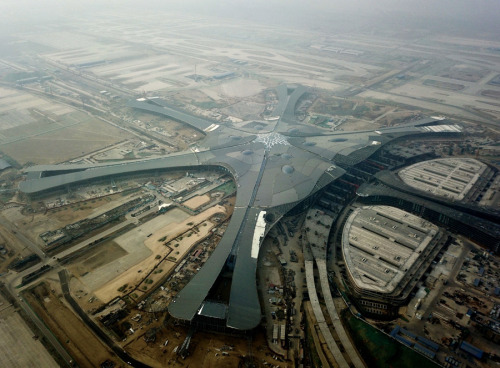


The roof of Beijing's new airport nears completion in January. Operations are to begin in October 2019. (Photo/Xinhua)
Beijing Daxing International Airport, the capital's new mega airport, will be supported with an extensive transportation network featuring five north-south and two west-east lines, according to the city's top economic planner.
Located at the junction of Beijing's Daxing District and Langfang, a city in Hebei Province, the new airport will be a massive international hub comprising aviation, high-speed rail, rail transit and expressways, and also an important engine for regional economic development.
It is designed to take pressure off overcrowded Beijing Capital International Airport in the northeastern suburbs.
A new high-speed railway service, the Beijing–Xiongan intercity railway, is under construction to connect urban areas of Beijing, the city's Daxing District, the new airport and finally Xiong'an.
A new expressway started in December 2016 will open next May along with the high-speed railway's Beijing-Daxing airport section, said Beijing Development and Reform Commission, adding Daxing airport-Xiongan section will also undergo test operation.
Work on support roads and municipal infrastructure for the “5+2” transportation network has also made steady progress.
 Fire brigade in Shanghai holds group wedding
Fire brigade in Shanghai holds group wedding Tourists enjoy ice sculptures in Datan Town, north China
Tourists enjoy ice sculptures in Datan Town, north China Sunset scenery of Dayan Pagoda in Xi'an
Sunset scenery of Dayan Pagoda in Xi'an Tourists have fun at scenic spot in Nanlong Town, NW China
Tourists have fun at scenic spot in Nanlong Town, NW China Harbin attracts tourists by making best use of ice in winter
Harbin attracts tourists by making best use of ice in winter In pics: FIS Alpine Ski Women's World Cup Slalom
In pics: FIS Alpine Ski Women's World Cup Slalom Black-necked cranes rest at reservoir in Lhunzhub County, Lhasa
Black-necked cranes rest at reservoir in Lhunzhub County, Lhasa China's FAST telescope will be available to foreign scientists in April
China's FAST telescope will be available to foreign scientists in April "She power" plays indispensable role in poverty alleviation
"She power" plays indispensable role in poverty alleviation Top 10 world news events of People's Daily in 2020
Top 10 world news events of People's Daily in 2020 Top 10 China news events of People's Daily in 2020
Top 10 China news events of People's Daily in 2020 Top 10 media buzzwords of 2020
Top 10 media buzzwords of 2020 Year-ender:10 major tourism stories of 2020
Year-ender:10 major tourism stories of 2020 No interference in Venezuelan issues
No interference in Venezuelan issues
 Biz prepares for trade spat
Biz prepares for trade spat
 Broadcasting Continent
Broadcasting Continent Australia wins Chinese CEOs as US loses
Australia wins Chinese CEOs as US loses